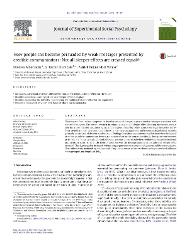| dc.contributor.author | Albarracin, Dolores | |
| dc.contributor.author | Kumkale, Gökçe Tarcan | |
| dc.contributor.author | Vento, Patrick Poyner-Del | |
| dc.date.accessioned | 2019-06-27T08:01:35Z | |
| dc.date.available | 2019-06-27T08:01:35Z | |
| dc.date.issued | 2017 | |
| dc.identifier.issn | 0022-1031 | en_US |
| dc.identifier.issn | 1096-0465 | en_US |
| dc.identifier.uri | https://hdl.handle.net/20.500.12469/413 | |
| dc.identifier.uri | https://doi.org/10.1016/j.jesp.2016.06.009 | |
| dc.description.abstract | The sleeper effect has been proposed to describe temporal changes in persuasion for messages associated with noncredible sources. The present research introduces a new kind of sleeper effect denoting increases in persuasion for weak messages associated with credible sources. This effect of the source was hypothesized to derive from attending to the message source rather than the message arguments and reconstructing delayed attitudes primarily on the basis of the source information. Findings from three experiments revealed that when the focus of attention was the communicator there was a sleeper effect for the source. Specifically during the time between an immediate follow up and a delayed follow up persuasion increased when credible sources presented weak arguments. In contrast when the focus of attention was the message arguments a traditional sleeper effect emerged. That is persuasion increased when strong arguments were presented by a noncredible communicator. These effects were mediated by relative recall of arguments versus source attributes and replicated with different message topics and lengths of delay. (C) 2016 Published by Elsevier Inc. | en_US] |
| dc.language.iso | eng | en_US |
| dc.publisher | Academic Press Inc Elsevier Science | en_US |
| dc.rights | info:eu-repo/semantics/openAccess | en_US |
| dc.subject | Sleeper effect | en_US |
| dc.subject | Attitude stability | en_US |
| dc.subject | Persuasion | en_US |
| dc.subject | Persistence | en_US |
| dc.subject | Memory | en_US |
| dc.subject | Attitude change | en_US |
| dc.title | How people can become persuaded by weak messages presented by credible communicators: Not all sleeper effects are created equal | en_US |
| dc.type | article | en_US |
| dc.identifier.startpage | 171 | en_US |
| dc.identifier.endpage | 180 | |
| dc.relation.journal | Journal of Experimental Social Psychology | en_US |
| dc.identifier.volume | 68 | en_US |
| dc.department | Fakülteler, İktisadi, İdari ve Sosyal Bilimler Fakültesi, Psikoloji Bölümü | en_US |
| dc.identifier.wos | WOS:000389396600020 | en_US |
| dc.identifier.doi | 10.1016/j.jesp.2016.06.009 | en_US |
| dc.identifier.scopus | 2-s2.0-84978962184 | en_US |
| dc.institutionauthor | Kumkale, Gökçe Tarcan | en_US |
| dc.relation.publicationcategory | Makale - Uluslararası Hakemli Dergi - Kurum Öğretim Elemanı | en_US |
| dc.identifier.pmid | 34054141 | en_US |
















